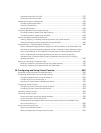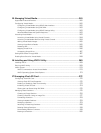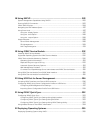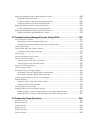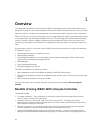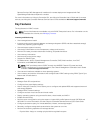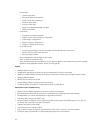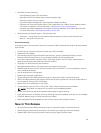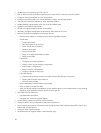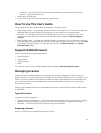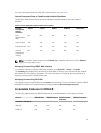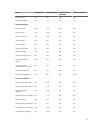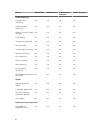
• Use iDRAC Service Module to:
– View Operating System (OS) information
– Replicate Lifecycle Controller logs to operating system logs
– Automatic system recovery options
– Populate Windows Management Instrumentation (WMI) information
– Integrate with Technical Support Report. This is applicable only if iDRAC Service Module Version
2.0 or later is installed. For more information, see Generating Tech Support Report.
– Integrate with NVMe Management for Prepare to Remove operation on a NVMe class PCIe SSD.
For more information, see Preparing to Remove PCIe SSD.
• Generate technical support report in the following ways:
– Automatic — Using iDRAC Service Module that automatically invokes the OS Collector tool.
– Manual — Using OS Collector tool
Secure Connectivity
Securing access to critical network resources is a priority. iDRAC implements a range of security features
that includes:
• Custom signing certificate for Secure Socket Layer (SSL) certificate.
• Signed firmware updates.
• User authentication through Microsoft Active Directory, generic Lightweight Directory Access
Protocol (LDAP) Directory Service, or locally administered user IDs and passwords.
• Two-factor authentication using the Smart–Card logon feature. The two-factor authentication is
based on the physical smart card and the smart card PIN.
• Single Sign-on and Public Key Authentication.
• Role-based authorization, to configure specific privileges for each user.
• SNMPv3 authentication for user accounts stored locally in the iDRAC. It is recommended to use this,
but it is disabled by default.
• User ID and password configuration.
• Default login password modification.
• Set user passwords and BIOS passwords using one way hash format for improved security.
• SMCLP and Web interfaces that support 128-bit and 40-bit encryption (for countries where 128 bit is
not acceptable), using the SSL 3.0 standard.
• Session time-out configuration (in seconds).
• Configurable IP ports (for HTTP, HTTPS, SSH, Telnet, Virtual Console, and Virtual Media).
NOTE: Telnet does not support SSL encryption and is disabled by default.
• Secure Shell (SSH) that uses an encrypted transport layer for higher security.
• Login failure limits per IP address, with login blocking from that IP address when the limit is exceeded.
• Limited IP address range for clients connecting to iDRAC.
• Dedicated Gigabit Ethernet adapter on rack or tower servers with Enterprise license.
New In This Release
• Set user passwords and BIOS passwords using one way hash format for improved security.
• Optimize system performance and power consumption by modifying the thermal settings.
• Update iDRAC and Lifecycle Controller firmware using a single firmware image.
19



